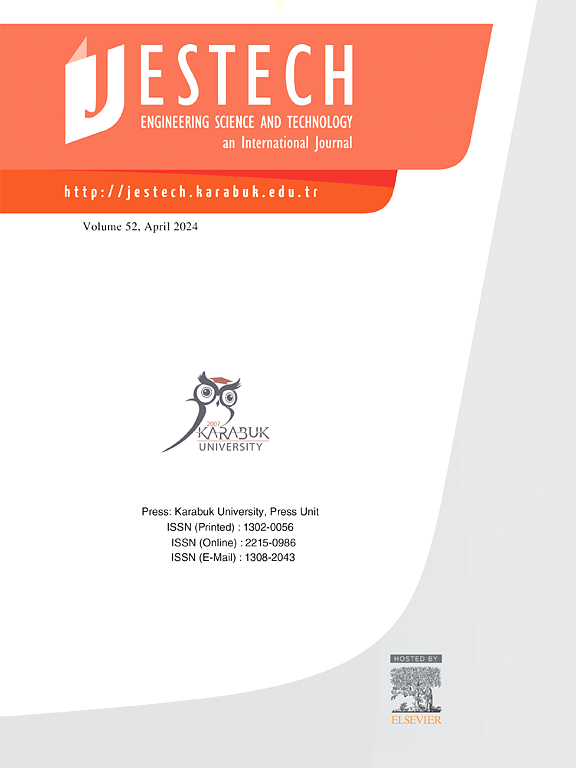聚对苯二甲酸丁二醇酯/有机改性粘土纳米复合材料的链延伸
IF 5.1
2区 工程技术
Q1 ENGINEERING, MULTIDISCIPLINARY
Engineering Science and Technology-An International Journal-Jestech
Pub Date : 2024-11-21
DOI:10.1016/j.jestch.2024.101910
引用次数: 0
摘要
聚对苯二甲酸丁二醇酯(PBT)/有机改性粘土(organoclay)纳米复合材料在挤出温度升高时不可避免地会发生热降解,这限制了这些纳米复合材料的广泛应用。本研究旨在通过扩链剂辅助反应挤压法制备性能更强的 PBT/有机粘土纳米复合材料。在制备纳米复合材料时使用了商用有机土 Cloisite 30B (C30B),并首次使用了具有多环氧官能团的扩链剂 Joncryl ADR 4300 (Joncryl)来补偿有机土加速的 PBT 热降解。形态观察结果表明,C30B 在基体中的分层程度很高,而 Joncryl 的加入则导致了良好的剥离结构。在流变学测试中,未扩链的纳米复合材料出现了基质降解,而扩链剂在抵消降解方面的显著优势体现在粘弹性能的改善上。与纯 PBT 相比,未扩链纳米复合材料的拉伸模量增加了 33%,而带扩链剂纳米复合材料的拉伸模量增加了 56%。热重分析表明,在纳米复合材料中添加 Joncryl 后,热分解温度更高。结论是 Joncryl 重新耦合了 PBT 的降解链,有效改善了纳米复合材料的特性。本文章由计算机程序翻译,如有差异,请以英文原文为准。
Chain extension of poly(butylene terephthalate)/organically modified clay nanocomposites
Thermal degradation of poly(butylene terephthalate) (PBT)/organically modified clay (organoclay) nanocomposites at elevated extrusion temperatures is inevitable and restricts the extensive use for these nanocomposites. This study aimed to prepare PBT/organoclay nanocomposite with enhanced properties by chain extender assisted reactive extrusion approach. A commercial organoclay, Cloisite 30B (C30B), was employed to prepare nanocomposite and a chain extender having multi epoxy functional groups, Joncryl ADR 4300 (Joncryl), was used to compensate thermal degradation of PBT accelerated by the organoclay for the first time. The morphological observations revealed high delamination of C30B within the matrix and the incorporation of Joncryl led to a well-exfoliated structure. The non-chain extended nanocomposite showed the matrix degradation in the rheological tests, where the notable benefit of the chain extender to offset degradation was observed by improvements in the viscoelastic properties. Compared to neat PBT, the tensile modulus of non-chain extended nanocomposite increased by 33 %, whereas a 56 % enhancement was measured for nanocomposite with chain extender. Thermogravimetric analyses indicated higher thermal decomposition temperature with addition of Joncryl into the nanocomposites. It was concluded that Joncryl recoupled degraded chains of PBT and effectively improved the features of nanocomposites.
求助全文
通过发布文献求助,成功后即可免费获取论文全文。
去求助
来源期刊

Engineering Science and Technology-An International Journal-Jestech
Materials Science-Electronic, Optical and Magnetic Materials
CiteScore
11.20
自引率
3.50%
发文量
153
审稿时长
22 days
期刊介绍:
Engineering Science and Technology, an International Journal (JESTECH) (formerly Technology), a peer-reviewed quarterly engineering journal, publishes both theoretical and experimental high quality papers of permanent interest, not previously published in journals, in the field of engineering and applied science which aims to promote the theory and practice of technology and engineering. In addition to peer-reviewed original research papers, the Editorial Board welcomes original research reports, state-of-the-art reviews and communications in the broadly defined field of engineering science and technology.
The scope of JESTECH includes a wide spectrum of subjects including:
-Electrical/Electronics and Computer Engineering (Biomedical Engineering and Instrumentation; Coding, Cryptography, and Information Protection; Communications, Networks, Mobile Computing and Distributed Systems; Compilers and Operating Systems; Computer Architecture, Parallel Processing, and Dependability; Computer Vision and Robotics; Control Theory; Electromagnetic Waves, Microwave Techniques and Antennas; Embedded Systems; Integrated Circuits, VLSI Design, Testing, and CAD; Microelectromechanical Systems; Microelectronics, and Electronic Devices and Circuits; Power, Energy and Energy Conversion Systems; Signal, Image, and Speech Processing)
-Mechanical and Civil Engineering (Automotive Technologies; Biomechanics; Construction Materials; Design and Manufacturing; Dynamics and Control; Energy Generation, Utilization, Conversion, and Storage; Fluid Mechanics and Hydraulics; Heat and Mass Transfer; Micro-Nano Sciences; Renewable and Sustainable Energy Technologies; Robotics and Mechatronics; Solid Mechanics and Structure; Thermal Sciences)
-Metallurgical and Materials Engineering (Advanced Materials Science; Biomaterials; Ceramic and Inorgnanic Materials; Electronic-Magnetic Materials; Energy and Environment; Materials Characterizastion; Metallurgy; Polymers and Nanocomposites)
 求助内容:
求助内容: 应助结果提醒方式:
应助结果提醒方式:


